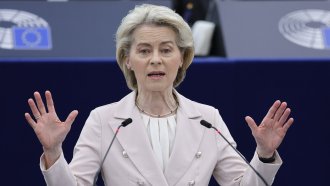The Constitutional Court Rules the Istanbul Convention Unconstitutional

With 8 votes in favor and 4 against the Bulgarian Constitutional Court ruled on Friday that the Istanbul Convention contradicts the constitution.
One of the leading motives of the 8 in favor is the ‘concern’ that defining gender as socially constructed and fluidic would lead to the inability of society to tell the difference between a woman and a man, which in turn would render the fight against violence against of women, one, a formality, and two – impossible. This is written in the official motives of the court.
It should be noted that the Bulgarian language does not distinguish between biological sex and gender: there is one word for both; gender is typically called ‘social(ly constructed) (biological) sex’. The word ‘gender’ has also transliterated to Bulgarian but is not used in formal settings, and – also – since the Istanbul Convention controversy, the term has been used by opponents of the convention, straining it with negative connotations.
While outrageous in its result and demonstrating dramatically crippled reasoning and knowledge of social realities, the court’s ruling is not surprising.
Nearly two months ago the court – unofficially – announced that it will be ruling against the Istanbul Convention.
Originally the convention was pulled from the Bulgarian Parliament, which was supposed to vote on it, under pressure from the right-wing nationalists United Patriots and the left-wing BSP. In an unlikely alliance, both parliamentary groups cited the ‘gender-ing’ of Bulgarian society and delivered heated apocalyptic speeches with conspiracy-theory features, which predicted the annihilation of Bulgarian-ness, should the convention be passed.
This ultimately led the largest majority coalition party GERB to cave and pull out the convention and passing the case onto the Constitutional Court.
The Istanbul Convention is the most comprehensive international document for combating violence against women. It was adopted by the Council of Europe in 2011, enacted in August 2014, and signed by the EU in June 2017.
GERB Gives Up on the ‘Domuschiev Amendments’, which Shook the Government

Kiril Domuschiev
PM Boyko Borissov’s party GERB gave up on the scandalous proposal for amendments t the Privatization Act, whose aim was to save the businessmen Kiril Domuschiev and his brother from having to pay 58 million leva in penalties for violating the privatization contract for Navigation Maritime Bulgare (NAVIBULGAR).
The amendments were deemed lobbyist and quickly became known as the “Domuschiev amendments’.
President Roumen Radev vetoed the articles, which modify commitments in the privatization with a back date. The amendments would have been used by other privatizers as well. This was President Radevs first veto with which the largest ruling party, GERB, compiled, most likely due to the public pressure that arose as a result from some entirely custom-made amendments for a business, close to power.
This week, after GERB announced they would be abolishing the amendments the leader of ATAKA and the parliamentary group of the United Patriots, Volen Siderov, threatened to take out Valeri Simeonov from the government as he is ‘damaging’ to the government and to the business sector. Siderov called on Simeonov to apologize for his accusations that the government is lobbying.
Meanwhile PM BOyko Borissov and his deputy, Tsvetan Tsvetanov maintained that the lobbyism accusations are a ‘speculation’. Tsvetanov argued that the amendments had been introduced by GERB’s coalition partner, the United Patriotes, and GERB had only supported it out of solidarity with their partner.
The scandal concluded with a meeting to make amends between the leaders of GERB and the UP. The leaders decided (for the consecutive time) to resolve their differences on meetings among them instead of through the media from now on. Borissov announced that the government is stable. Neither he, nor the other leaders from the ruling coalition failed to comment on the fact why they had attempted to introduce policies in the interest of particular large-scale businessmen. Vice PM Simeonov did not diliver the apology Siderov had asked him for but the question of his replacement does not stand. Sometime before Borissov announced the government is stable, Siderov complained that an MP from Simeonov’s party had pushed him off his chair in the Patriots’ room.
On Thursday the veto was introduced to plenary and passed unanimously with 186 votes in favor. The preceding debate however was nothing if not heated. The opposition took the opportunity to accuse the largest majority party, GERB, of flipping only to save its leader and PM, Boyko Borissov from public backlash. GERB MPs accused the largest opposition party, BSP, of doing nothing about opposing the amendment when it was time to do so and using It for PR. The exchanges continued for long and expanded upon different instances of lobbying and a who’s who in the gray spaces intersecting large businesses and politics in Bulgaria, before finally coming to a vote.
President Roumen Radev Ratifies Controversial Fuel Bill
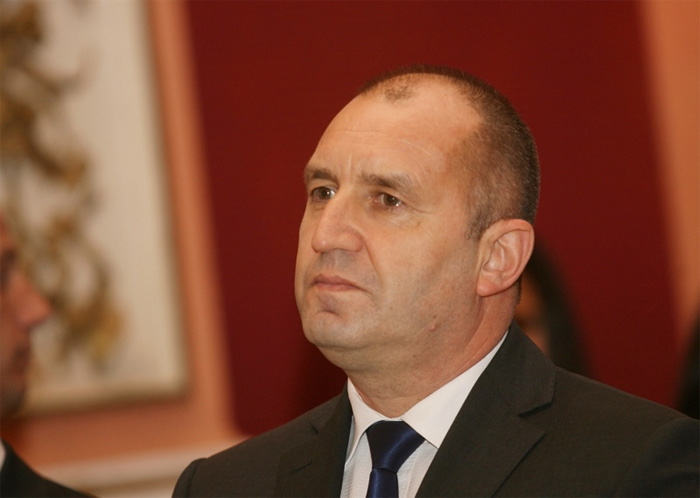
President Roumen Radev
President Roumen Radev refused to veto the controversial fuel bill. The bill, introduced by VMRO MP Emil Dimitrov was passed by Parliament despite the accusations of being purely lobbyist, serious criticism that the bill does not comply with EU law, and that it cripples competition on the fuel market.
The bill was protested against by medium and small fuel dealers, according to whom, if the bill becomes law, it will surely bankrupt them.
Vice PM Valeri Simeonov was extremely critical of the bill throughout the process of passing and enacting it, calling it lobbyist and favoring the largest players on the market, most notably Lukoil CEO Valentin Zlatev. Simeonov vowed to signal Brussels if the bill is passed, as it has not been sent to the European Commission for notification prior its passing, as European law requires.
The non-parliamentary opposition coalition Democratic Bulgaria together with the Association of Industrial Capital in Bulgaria called on the President last week to veto the bill. The two warned also that if enacted the bill can lead to a penal procedure by the EC because of non-compliance with VAT regulations.
Democratic Bulgaria also insisted that an inquiry be initiated to determine whether the champion of the bill – VMRO MP Emil Dimitrov – is in a conflict of interests.
Delyan Peevski Called On bTV to ‘Cleanse Itself” of Host Svetoslav Ivanov via His Newspapers

Svetoslav Ivanov
Telegraph Daily and Monitor Daily both published editorials, in which they call on bTV to ‘cleanse itself’ of its 120 Minutes show host Svetoslav Ivanov. DPS MP Delyan Peevsky frequently uses his newspapers to promote his legislative initiatives and smear campaigns.
The reason for the publications’ special attention is apparently Ivanov’s interview with Nu Boyana Film Studios CEO Yariv Lerner, which was aired recently. During the interview, Ivanov asked why would a film company be interested in getting into the newspaper industry.
Nu Boyana Film Studios is owned by Nu Image Bulgaria, also managed by Lerner. In April reports emerged that the latter has signed a preliminary contract for acquiring half of Delyan Peevski’s newspaper business. The news was surprising for various reasons, not least of which that the American company has no experience in the newspaper industry whatsoever. Some observers speculated that the company could benefit from the political influence of Peevski’s businesses to finally succeed in securing tax cuts, for which it has been pushing with no success for some time.
During the interview, Ivanov asked Lerner whether he is concerned that “some of these editions are heavily strained by their negative reputation, suspicions of political dependency and their utilization in smear campaigns against economic and political opponents.”
Ivanov added that “this is something that has been established not only within the Bulgarian public but also by large international organizations.”
Lerner answered that yes, he is concerned by this and that the deal “won’t be finalized soon.”
The deal in currently under review at the Commission for the Protection of Competition.
The following Monday (120 Minutes airs on Sunday) Telegraph Daily and Monitor Daily came out with the editorials calling on bTV to cleanse itself of such journalists and accusing Ivanov of ties with the usual Peevski foes: Tsvetan Vassilev (former chair of the supervisory board of the now bankrupt and former close ally of Peevski’s Corporate Trade Bank), Ivo Prokopiev (publisher of Capital Weekly and Dnevnik.bg) , Sasho Donchev (publisher of Sega Daily), and George Soros (philanthropist, founder of the Open Society Foundations).
bTV failed to come forward with a firm message in support of its host. Instead, it used the opportunity to issue a standard and somewhat joyful in its wording message that the show was going on summer break and will be coming back for its next season on September 9.
The Bulgarian section of the European Journalists’ Association, however, was far more vocal and on point in a statement issued on Wednesday:
“As such attacks against journalists are not without precedent and given Delyan Peevski’s political and economic influence in Bulgaria, such publications [as those in Monitor Daily and Telegraph Daily] could be viewed as threats against the journalist and an attempt to pressure the channel’s management”
“We categorically oppose any form of threats against our colleagues because of questions they ask as part of their work. Calls for ‘cleansing’ of media from journalists who dare ask, that is – to do their jobs responsibly – are unacceptable.”
The Association goes on to state that the case is very similar to a previous instance in the other largest private TV network, NOVA TV. A while back, when there was a possibility of Peevski to acquire the network, his fellow MP, Yordan Tsonev, told the hosts of the morning show: “Peevski sends his regards and wishes you future success”. A little later one member of the host-duo, Anna Tsolova, suddenly vanished from the air, while her co-host started receiving threats from politicians, members of the ruling party.”
“If such well-known journalists from national networks can be subjected to such publically visible pressure, then surely the professionals working in smaller media are in a far more severe situation.”, the organization concludes.
The Sin Tax for Heat Sticks Will Continue to Rise

After an almost unprecedented in its speediness passing of increase of sin tax for heat sticks, Chair of the Parliamentary Budget Committee Menda Stoyanova announced that this is only a first step. The current tax on heat sticks amounts to 26% of the tax on conventional cigarettes. That will rise to 40% effective October 1. The tax won’t be calculated per stick, or cigarette as for the conventional ones, but per kilogram tobacco. This way the amount of tax on a kilo of tobacco for heat sticks will be 233 leva, the current tax is 152 leva. This means that the actual increase per pack will be about 0,50 leva.
Initially, Stoyanova moved for the tax on heat sticks and conventional cigarettes to be equal but the motion received severe public backlash. As a consequence, the ruling coalition compromised to push for the sin tax to increase to 40% of that of regular cigarettes.
However, Stoyanova indicated on Tuesday, that this increase is only a first step in a series of tax rises the self-declared liberal-right government is apparently planning to introduce. Again, as during the initial idea for a 100% tax, the reasoning of the government has nothing to do with public health, but declines in budget income. Stoyanova cited the fact that two more producers of heat sticks are expected to enter the market soon. Currently, the only producer selling heat sticks in Bulgaria is Phillip Morris with their IQOS. The fact that conventional smokers will switch to sticks, whereby increasing sticks’ market share and decreasing regular cigarettes’, will lead to lower budget income. This is why the government – by its own claims – will push for yet higher tax for heats in the future, before – or at the time – the new players enter the market.
Asked if new increased could be expected by January 2018, Stoyanova couldn’t say.
Meanwhile, the left-wing and largest opposition party BSP maintains the position that instead of taxing, the heat sticks should be stimulated as they are far less hazardous to smokers’ health. The ruling coalition, however, remains unconvinced that the technology mitigates many of the risks from smoking.
Rosatom Deputy General Director Kiril Komarov Visits PM Boyko Borissov, Reaffirms Support for NPP Belene
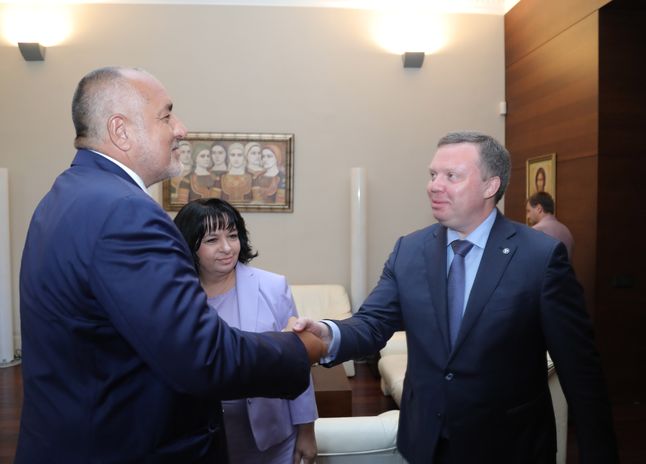
Boyko Borissov, Temenuzhka Petkova, and Kiril Komarov
Rosatom’s First Deputy General Director Kiril Komarov reassured PM Boyko Borissov of the company’s interest in supporting the renewal of the NPP Belene project. Komarov and Borissov held talks in the Council of Ministers on Thursday.
Komarov reaffirmed Rosatom’s interest in the project a day earlier during a ceremony marking the end of studies connected to the exploitation potential of NPP Belene, carried out by a consortium of which Rosatom is part of.
During the ceremony, he said that his company is ready to be part of the project “in a form convenient to the government”. He has repeated this notion personally to Borissov the next day:
“I welcome the Bulgarian government’s decision to renew the NPP Belene project and we will be happy to help in its realization.”
“As before, we continue to feel that this is an important and much-needed project for guaranteeing the country’s energy security and achieving low power prices.”
In June Parliament passed a resolution, which repealed the previous resolution for ceasing NPP Belene from 2012. Borissov has informed Komarov that one of the conditions of the resolution is that NPP Belene be built under market conditions, without state guarantees, together with a strategic investor.
However, the day before, after the ceremony Komarov said:
“The recommendations we give the Bulgarian government and the Bulgarian Energy Ministry is to explore all possibilities for realizing the project. The reality is that such projects do not happen without state participation. What form would such participation take is up to the government.”
Energy Minister Temenuzhka Petkova has until October 31, 2018, to find a strategic investor for the controversial project and to introduce a procedure for selection of a strategic partner. The selection process is expected to be open by the end of 2018.
Komarov refrained from a specific answer as to whether Rosatom plans to enter such a procedure and said that they would decide only after examining closely the conditions of the procedure.
State Agency for National Security: Foreign Agencies for the Region Actively working in Bulgaria
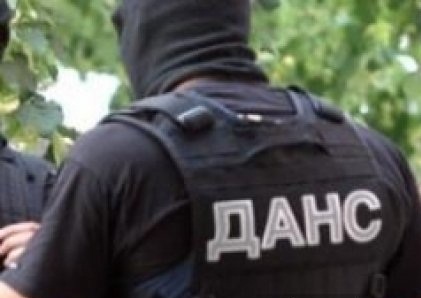
According to the State Agency for National Security’s annual report for 2017, foreign agencies from the region are actively working on Bulgarian soil for the realization of their foreign policy goals and strategic interests, by means of acquiring access to sensitive and classified information.
The reports asserted that there has been no danger of terror activity in 2017. The most significant terror threat continues to be from ISIS and SANS has intercepted propaganda and other activities, targeting vulnerable groups on the Balkans. Such activities are the reason for 31 instances of persons being either deported, banned from residency, or banned from entering the country.
Nikolay Kolev – Bosiya Admitted to Hospital on Forty-Second Day of Hunger Strike
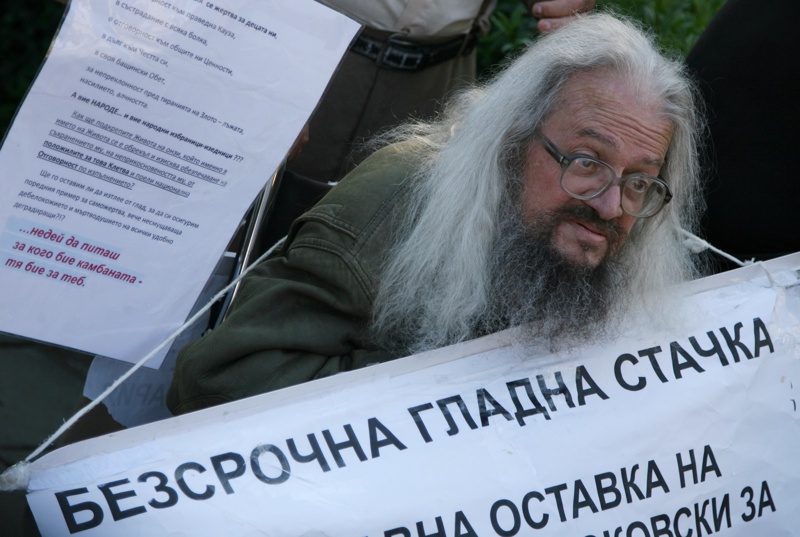
Nikolay Kolev - Bosiya
Bulgarian poet Nikolay Kolev – Bosiya, who has been on an indefinite hunger strike for over 40 days – was admitted to hospital. Kolev is on strike protesting the popular - and almost undisturbed by relevant authorities – black market for driver’s licenses, which is operated by corrupt officials. Kolev demands Transport Minister Ivaylo Moskovski’s resignation, the dissolution of Parliament and appointment of а provisional government.
Kolev wants Moskovski’s resignation in particular because – according to his allegations - officials, who have been fired from the Automobile Administration Agency on grounds of corruption, have been since been reinstated.
Meanwhile, the parliamentary committee, assembled following Kolev’s signals, seems inclined to appoint a probe to investigate alleged corrupt officials, who Kolev alleges are part of the driver’s licenses black market scheme. The probe will most likely be carried out by the Prosecutor’s Office.
За честна и независима журналистика
Ще се радваме, ако ни подкрепите, за да може и занапред да разчитате на независима, професионална и честна информационно - аналитична медия.
 0 коментара
0 коментара
Екипът на Mediapool Ви уведомява, че администраторите на форума ще премахват всички мнения, съдържащи нецензурни квалификации, обиди на расова, етническа или верска основа.
Редакцията не носи отговорност за мненията, качени в Mediapool.bg от потребителите.
Коментирането под статии изисква потребителят да спазва правилата за участие във форумите на Mediapool.bg
Прочетете нашите правила за участие във форумите.
За да коментирате, трябва да влезете в профила си. Ако нямате профил, можете да се регистрирате.



